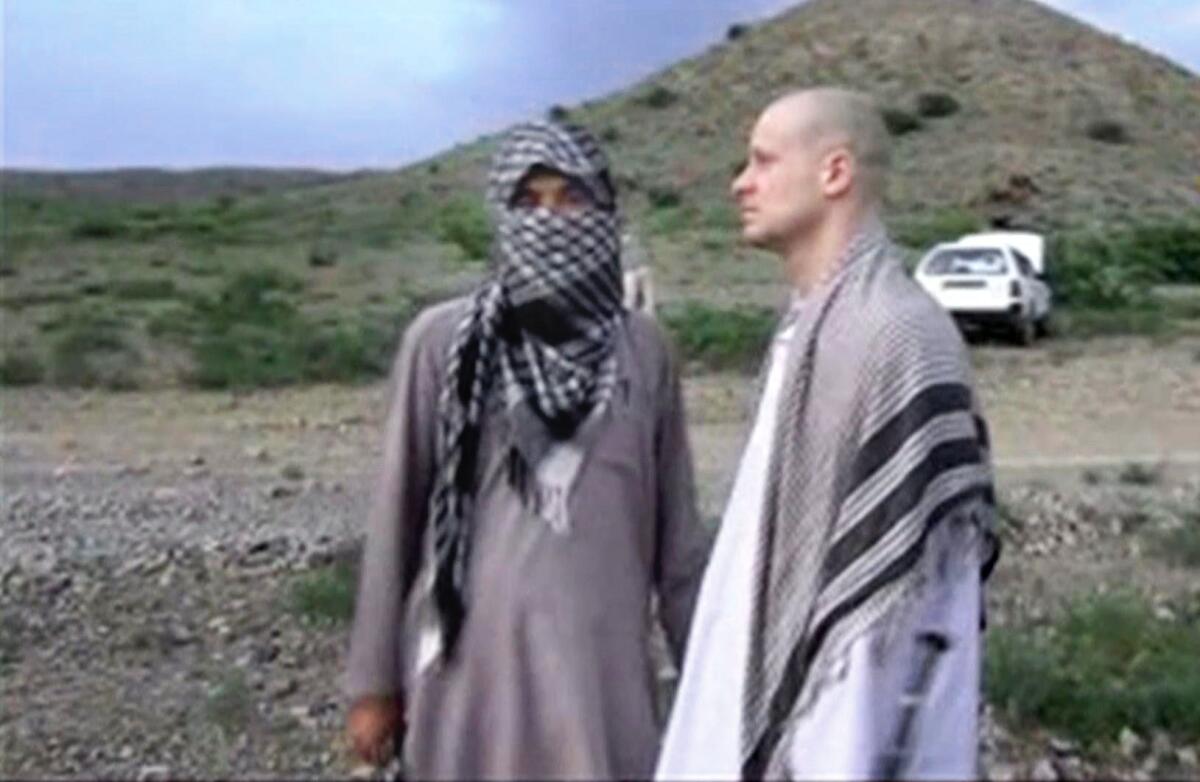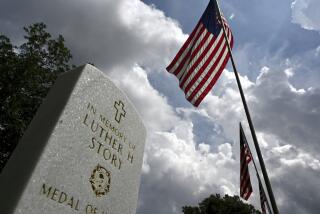Bergdahl release stirs fresh controversy over whether searchers died

- Share via
Reporting from San Diego — While members of Congress criticize the Obama administration for the way Army Sgt. Bowe Bergdahl’s nearly five years in Taliban captivity ended, another controversy is raging about how it began.
Several of those who served with Bergdahl in the rugged mountains of eastern Afghanistan charge that soldiers died searching for him after he disappeared from his base. Experts are divided; in the fog of war, several questioned whether it would ever be clear whether soldiers died as a result.
“Directly or indirectly, people died because of what Bergdahl did,” said former Army medic Joshua Cornelison, who was part of a 30-man platoon that included Bergdahl. “He’s responsible for some soldiers’ deaths. They died looking for him.”
Cornelison said that soldiers died either on search missions or on other missions that lacked normal combat support because resources were diverted to look for Bergdahl.
Other former soldiers, no longer bound by Army rules about not discussing Bergdahl, have said much the same and have attracted broad attention. The pictures of six soldiers they claim were killed during patrols assigned to find Bergdahl are being shown repeatedly on television.
Defense officials have responded cautiously. A Defense Department spokeswoman declined to comment on the assertions that soldiers were killed during a massive 90-day search for Bergdahl after he went missing on June 30, 2009. An initial Army investigation four years ago concluded that he had walked away from his unit without authorization.
Defense Secretary Chuck Hagel told reporters, “I don’t know of any circumstances or details of U.S. soldiers dying as a result of efforts to get Bergdahl.”
Bing West, like Hagel a combat veteran of Vietnam and an assistant secretary of Defense in the Reagan administration, said it was likely that soldiers died looking for Bergdahl.
“Once a soldier is missing, hundreds of patrols are dispatched to find him,” said West, author of books about Marines in combat in Iraq and Afghanistan. “Undoubtedly some soldiers were killed during the search over so many years.”
Other combat veterans and war historians caution that getting to the truth is very difficult.
“Sometimes you’ll never know,” said historian and journalist Marc Leepson. “Things happen in a fraction of a second. You know how they say that the worst witness is an eyewitness? Put that in the context of the battlefield and it’s hundreds of times worse.”
Memories can be faulty or contradictory, “after-action” reports can be skimpy or nonexistent, and sometimes enlisted personnel may not be privy to the complex reasons for any given patrol.
“You get three guys who had the same experience and you can get three different accounts, particularly when they’re under stress and sleep deprivation,” said Peter Owen, a retired Marine lieutenant colonel who led troops during the assault on Baghdad in 2003. He later wrote a book about World War I and said the research illustrated the limitation of after-action reports.
“The rumor mill [is] dawn to dusk,” said Leepson, the historian. “The rumors get flying, sometimes with a kernel of truth, sometimes with none.”
While military officials have promised an investigation into the circumstances of Bergdahl’s capture, they have stopped short of promising a review of assertions about soldiers dying.
“At the appropriate time,” Army Chief of Staff Gen. Raymond Odierno said Wednesday, “we will conduct a thorough, transparent and complete review of the circumstances surrounding his capture.”
Soldiers who served with Bergdahl agree that a full review is needed.
Evan Beutow, a former sergeant, said that although the unit was posted in a dangerous area subject to regular Taliban attacks, Bergdahl’s actions meant soldiers were exposed to even greater dangers because of the demands of the search.
Gerald Sutton, a former Army specialist, said Bergdahl “put our lives in danger.”
“All our normal assets were diverted to the search to find Bergdahl,” Sutton said. “He needs to be held accountable.”
Cornelison put the number of soldiers who died looking for Bergdahl at seven.
“He’s not a hero, he’s a deserter,” he said. “The heroes are the seven people who died because of his actions.”
Perry reported from San Diego and Zucchino from Durham, N.C.
More to Read
Sign up for Essential California
The most important California stories and recommendations in your inbox every morning.
You may occasionally receive promotional content from the Los Angeles Times.














